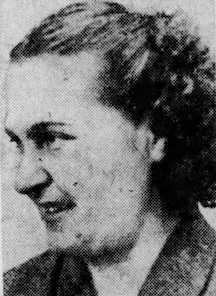Barbara Armonas (Lithuanian: Barbora Armonienė; December 28, 1908 – December 25, 2008) was a Lithuanian political prisoner in the Soviet Union. She rejoined her American-born husband and daughter in the United States in 1960, and she published a memoir, Leave Your Tears in Moscow, in 1961.
Barbara Armonas | |
|---|---|
 Barbara Armonas, from a 1960 newspaper photo | |
| Born | Barbora Balčiūnaitė[1] December 28, 1908 |
| Died | December 25, 2008 (aged 99) |
| Other names | Barbora Armonienė |
| Known for | Political prisoner |
| Notable work | Leave Your Tears in Moscow (1961, memoir) |
Biography
editEarly years
editArmonas was born in a small village of Maskoliškiai near Pasvalys in northern Lithuania.[1] She married a Lithuanian-American machinist, John Armonas, in 1929. They lived in Cleveland, Ohio, for six years; their daughter, Donna, was born in Ohio. They moved to Lithuania in the 1930s, and bought a farm in Suostas; their son John was born in Lithuania.[2]
War years and after
editIn 1939, American citizens were warned to leave Lithuania; her husband and five-year-old daughter left, but she and her infant son did not have the paperwork ready to join them, so both stayed behind.[3] She and her son were deported to Siberia in 1948, and she was tried as an American spy in 1951. While serving her prison sentence in a women's work camp, she was assigned to sew clothing in a factory, and do gardening at an exhibition camp. In 1955, she was allowed to return to Lithuania under an amnesty for political prisoners. She lived in a rented room in Pasvalys.[4]
In late 1959,[5] after meeting with David L. Lawrence, governor of Pennsylvania,[6] and after years of pleas from John and Donna Armonas,[4][7][8] Nikita Khrushchev agreed to allow the Armonas mother and son to leave the Soviet Union.[9] They finally left in 1960.[2][10] The family was reunited in Copenhagen after almost 22 years apart.[11]
Later years
editArmonas lived in Ohio with her husband and children after 1960.[12] She completed a memoir with writer Algirdas L. Nasvytis, Leave Your Tears in Moscow (1961).[13] "No one who reads it will fail to be moved by this courageous woman's account of her struggle for survival in a police state", said one American reviewer in 1965.[14] Her book was translated into at least four other languages, and excerpts were published in Life magazine.[15][16]
In her later years, Armonas was active in Lithuanian community activities in Cleveland. Her husband died shortly after they celebrated their fiftieth anniversary in 1979.[17] After Lithuanian independence in 1991, she was able to visit family members in Lithuania. She died in 2008, three days before her 100th birthday, in Mentor, Ohio.[2] Her memoir was published in a new edition in 2011, on its fiftieth anniversary, with additional photographs and material added by her son.[18] Her son also published a memoir, How I Became a Comrade: An American Growing Up in Siberian Exile (2013).[19]
References
edit- ^ a b Lapinskaitė, Bronislava (2019). "Paryžius–JAV–Pasvalys: žmonių ir daiktų istorijos" (PDF). Lietuvos muziejų rinkiniai (in Lithuanian). 18: 42. ISSN 1822-0657.
- ^ a b c "Barbara Armonas" The New Herald (January 6, 2009).
- ^ Cadzow, John (2020-01-31). "Lithuanian Press and Radio". Lithuanian Americans and Their Communities of Cleveland. Cleveland Ethnic Heritage Studies, Cleveland State University.
- ^ a b "City Rabbi Hopeful of Plea Sent Nikita". Pittsburgh Sun-Telegraph. 1959-10-07. p. 12. Retrieved 2022-07-02 – via Newspapers.com.
- ^ "K Keeps Promise, Frees Mother, Son". The Knoxville News-Sentinel. 1959-12-25. p. 2. Retrieved 2022-07-02 – via Newspapers.com.
- ^ "Lawrence Nudges Khruschev on Pledge". The Pittsburgh Press. 1959-11-03. p. 3. Retrieved 2022-07-02 – via Newspapers.com.
- ^ Taylor, Harry (1957-06-05). "Ohio Girl Calls Bluff of Red Boss". The Cincinnati Post. p. 1. Retrieved 2022-07-02 – via Newspapers.com.
- ^ "Trygve Lie Has 'Mission' in Russia". Dayton Daily News. 1950-04-17. p. 2. Retrieved 2022-07-02 – via Newspapers.com.
- ^ Zewen, Ann (1971-06-13). "Khruschev Vow Ends 20-year Separation". The Orlando Sentinel. p. 3. Retrieved 2022-07-02 – via Newspapers.com.
- ^ "Waiting". The Evening Sun. 1960-02-17. p. 3. Retrieved 2022-07-02 – via Newspapers.com.
- ^ "Lithuanian Woman, Son Headed to America". The Wichita Beacon. 1960-03-04. p. 3. Retrieved 2022-07-02 – via Newspapers.com.
- ^ "Party at Armonas Home Real Big One". The News-Messenger. 1960-03-08. p. 3. Retrieved 2022-07-02 – via Newspapers.com.
- ^ Armonas, Barbara; Nasvytis, Algirdas L (1961). Leave your tears in Moscow. Philadelphia: Lippincott. OCLC 1042831.
- ^ Inman, Marian (1965-04-15). "Ink in my Veins". Kossuth County Advance. p. 21. Retrieved 2022-07-02 – via Newspapers.com.
- ^ Armonas, Barbara. "Ordeal in Siberia" Life (April 28, 1961): 84-94.
- ^ Armonas, Barbara. "Anguish in Prison, Then the Miracle" Life (May 5, 1961): 107-120.
- ^ "Couple Remembers When Life Bleaker". The Marion Star. 1979-07-08. p. 6. Retrieved 2022-07-02 – via Newspapers.com.
- ^ Armonas, Barbara; Nasvytis, A. L. (2011). Leave Your Tears in Moscow. Meridia Publishers. ISBN 978-0983233039.
- ^ Armonas, John E. How I Became a Comrade: An American Growing Up in Siberian Exile (Meridia Publishers 2013). ISBN 9780983233077